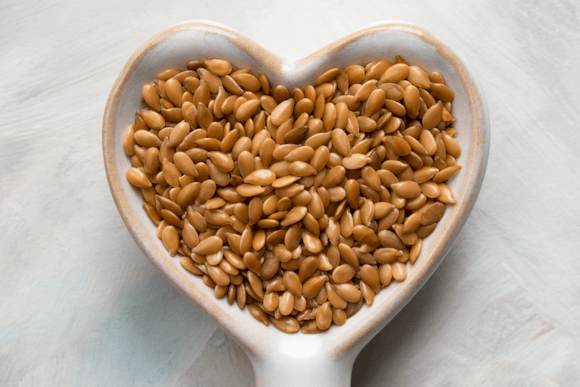Women need to be particularly aware of the need for monitoring and reducing blood pressure levels. When high blood pressure (hypertension) is detected, there are a number of ways to reduce the risk including lifestyle and diet modification with the inclusion of heart healthy nutrients such as flaxseed.
In her hypertension diet article for this feature (see below), Cara Shaw points out that over 7.6 million people in the UK are living with a heart or circulatory disease, and whilst there are many different risk factors for developing cardiovascular disease, high blood pressure is the leading modifiable risk factor, with others including obesity, high cholesterol, poor diets and sedentary lifestyles (1).
Cardiovascular disease is the leading cause of death in women and high blood pressure, (or hypertension), is the most deadly risk factor for women worldwide. If left untreated high blood pressure can lead to heart attack and stroke. Yet research repeatedly shows that women with cardiovascular conditions are far more likely than men to be misdiagnosed. Why is this?
Dr Amarjit Raindi, North London GP and founder of GP Clinic London explains: "There are a number of factors behind the gender-based mis-diagnosis of cardiovascular conditions. These include:
- Heart disease is generally thought of as a condition that affects men, so symptoms in women are often assumed to be caused by something else;
- Heart attack symptoms are different in women and men, and this can lead to confusion;
- There are female-specific risks, such as an increased chance of developing high blood pressure later in life if this was experienced during pregnancy. Often this is poorly understood or appreciated by the medical profession.
- General guidance is often designed for men and typical symptoms in men don't help to diagnose cardiovascular disease in women;
- The medical profession does need to improve training so that doctors and medical providers become much better at spotting and accurately diagnosing heart problems in women."
Click here to book a blood pressure appointment
My message to all women is to take your blood pressure seriously
 Professor Angela Maas, an internationally acknowledged expert in heart disease in women and spokesperson for the European Society of Cardiologists agrees. She adds:
Professor Angela Maas, an internationally acknowledged expert in heart disease in women and spokesperson for the European Society of Cardiologists agrees. She adds:
" Cardiovascular disease is the leading cause of death in women and the risk increases at a lower blood pressure level in women compared to men. My message to all women is to take your blood pressure seriously, know your values and convince your doctor that if it is too high then you need treatment. Don't underestimate the long-term effects of high blood pressure. "
Know your blood pressure
Ahead of World Hypertension Day in May, doctors urge women to know their blood pressure, and to understand the key steps that can be taken to improve health - in order to help prevent heart disease and stroke. As pointed out by the European Society of Cardiology, risk for heart disease increases at a lower level in women compared with men. If you have concerns, a blood pressure monitoring appointment can be scheduled.
Hypertension in midlife is more harmful in women than in similarly aged men, and is a stronger risk factor for heart attack, cognitive decline and dementia. Prof Maas goes onto explain, “One of the most important consequences of hypertension in women is a type of heart failure in which the heart muscle is stiff. There are few treatments for that condition, so if you want to avoid symptoms such as shortness of breath, fatigue and fluid retention when you are over 70, you have to start treating high blood pressure in middle age. If you wait 20 years, it is too late.”
Hypertension is women is a big deal being one of the most important risk factors for death - affecting around one in three women. As Prof Maas points out despite the importance, hypertension in women is often underestimated and / or not sufficiently treated”.
Below the age of 50, hypertension is more prevalent in men than women. However, this health parameter reverses in the years after menopause so that after the age of 65, hypertension is more common in women than men.
What are the key symptoms of hypertension in women?
The symptoms of hypertension are more pronounced in women and can be be mistaken for menopause. The main symptoms include anxiety or stress, however, young and middle-aged women with high blood pressure often also report the following:
- palpitations,
- chest pain,
- pain between the shoulder blades,
- headaches,
- difficulty concentrating,
- shortness of breath,
- tiredness,
- fluid retention,
- poor sleep,
- hot flushes and
- a feeling that their bra is too tight.
How can diet and nutrition help women reduce their blood pressure?
Flaxseeds: A natural way to reduce blood pressure
Cara Shaw, a renowned Women’s Health Nutritional Therapist and Nutrigenomics Practitioner who specialises in addressing complex health issues such as PCOS, infertility, and hormonal imbalances, explores flaxseeds as a natural way to reduce blood pressure. Leveraging her extensive expertise in nutritional therapy and personalised health strategies, she demonstrates how these small but mighty seeds can significantly impact your cardiovascular health and overall well-being.
Flaxseed to reduce blood pressure
Over 7.6 million people are living in the UK with a heart or circulatory disease and whilst there are many different risk factors for developing cardiovascular disease, high blood pressure is the leading modifiable risk factor, with others including obesity, high cholesterol, poor diets and sedentary lifestyles (1).
Dietary changes and the inclusion of health foods are getting increasing recognition as integral parts of lifestyle changes suggested to reduce the risk of cardiovascular and metabolic diseases (2, 3, 4, 5).
When it comes to foods that support health, flaxseeds are a powerful contender, as they contain beneficial compounds such as omega-3 fatty acids, lignans and fibre that have shown anti-inflammatory, anti-oxidative and lipid modulating properties (6). Let’s explore the research-backed advantages of flaxseeds, including their impact on cardiovascular health, and how you can incorporate them practically into your daily routine.
The cardiovascular benefits of ALA & lignans in Flaxseeds
Flaxseeds are a plant-based source of alpha-linolenic acid (ALA) – a type of omega-3 fatty acid (6). Omega-3s are well-known for their anti-inflammatory properties, their ability to improve heart health and help with reducing cardiovascular risk factors such as atherosclerosis – the hardening of the arteries (8).
Research has shown that the ALA content of flaxseed can reduce blood pressure and can improve cardiac function (7, 9). A double-blinded, randomised trial analysed individuals with peripheral artery disease (including those on blood pressure medication) and gave them either a placebo or 30g milled flaxseed per day, over a 6-month period (7). This study found that those who consumed flaxseeds, saw a significant 2-fold increase in ALA levels (even after only one month), and saw significant reductions in both systolic and diastolic blood pressure (7). The ALA content of flaxseed, along with lignans and fibrous compounds, were identified as possible reasons for the reductions in blood pressure (7).
Lignans are plant compounds that act as phytoestrogens and flaxseed is one of the richest sources of the lignan ‘secoisolariciresinol diglucoside’ (SDG). It has been suggested that the metabolism of SDG into enterolignans may play a cardioprotective role (6). Additionally, lignans have antioxidant properties that protect against oxidative stress, a key contributor to heart disease and can also support the heart by increasing the production of key proteins that support blood vessel growth and function (6,14).
Can Flaxseeds lower cholesterol levels?
High cholesterol levels can result in a build up of fatty deposits in the arteries which can then lead to an increased risk of cardiovascular complications (9).
Research suggests that flaxseed dietary fibres have the potential to decrease both total cholesterol and LDL-cholesterol (low density lipoprotein, commonly referred to as the ‘bad cholesterol’) and therefore may be a useful tool for lowering cholesterol levels (10,11).
One study found that the consumption of 5g dietary fibres from flaxseeds daily in healthy adults for one week, significantly reduced total and LDL-cholesterol, and increased the excretion of fats via bowel movements (10).
It was suggested that the likely reason is that flaxseed fibres increase gut viscosity (which essentially means the fibres absorb water and form a gel-like texture in the digestive system), interfering with how the body absorbs fats and cholesterol. This prevents some fats from being taken up and forces the liver to use more cholesterol to make bile acids, lowering cholesterol levels in the bloodstream (10).
While these effects of this particular study might be slightly exaggerated due to the short duration, similar reductions were seen in a three-month study on people with type 2 diabetes (11).
Additionally, a study based on 55 men and women with high cholesterol, found that lignans significantly lowered both total and LDL-cholesterol over an 8-week period (12).
Cardiovascular health & menopause
For menopausal women, the risk of heart disease increases due to reduced oestrogen levels (13). Oestrogen helps to keep cholesterol levels stable and with decreasing levels, it puts menopausal women at a higher risk of cardiovascular issues (13).
Flaxseeds are a convenient and practical way to support hearth health, particularly during this life stage. Both ALA and the metabolites of SDG are more bioavailable to the body in a milled form vs. whole, making Linwoods’ Milled flaxseed or Menoligna a great way to provide both cardioprotective compounds (6).
How to incorporate flaxseeds into your diet
Adding flaxseeds to your meals is simple and versatile. Linwoods’ Milled flaxseeds can be sprinkled on yogurt, porridge or overnight oats, mixed into smoothies, or used in baking. Aim for 1-2 dessertspoons daily for their heart-health benefits.
References
- British Heart Foundation. (2025). ‘UK Factsheet’. https://www.bhf.org.uk/-/media/files/for-professionals/research/heart-statistics/bhf-cvd-statistics-uk-factsheet.pdf?rev=81a8015761aa4ced8bc39d7045202be5&hash=9D78ACBF5EB80FA8A9BE28C90BFBE171
- (2024).’Coronary Heart Disease’. https://www.nhs.uk/conditions/coronary-heart-disease/prevention/
- (2023). ‘Metabolic Syndrome’. https://www.nhs.uk/conditions/metabolic-syndrome/
- Patient Info. (2022). ‘Metabolic Syndrome’. https://patient.info/doctor/metabolic-syndrome
- Patient Info. (2023). ‘Prevention of Cardiovascular Disease’. https://patient.info/doctor/prevention-of-cardiovascular-disease
- Parikh, M. Maddaford, T.G. Austria, J.A. et al. (2019). ‘Dietary Flaxseed as a Strategy for Improving Human Health’, Nutrients, 11(5). PMID: 31130604
- Rodriguez-Levya, D. Weighell, W. Edel, A.L. et al. (2013). ‘Potent Antihypertensive Action of Dietary Flaxseed in Hypertensive Patients’, Hypertension, 62(6). PMID: 24126178
- Elagizi, A. Lavie, C.J. O’Keefe, E. et al. (2021). ‘An Update on Omega-3 Polyunsaturated Fatty Acids and Cardiovascular Health’, Nutrients, 13(1). PMID: 33445534
- Patient info (2023). ‘High Cholesterol’. https://patient.info/heart-health/high-cholesterol#what-is-high-cholesterol
- Kristensen, M. Jensen, M. Aarestrup, J. et al. (2012). ‘Flaxseed dietary fibers lower cholesterol and increase fecal fat excretion, but magnitude of effect depend on food type’, Nutrition & Metabolism. PMID: 22305169
- Thakur, G. Mitra, A. Pal, K. et al. (2009). ‘Effect of flaxseed gum on reduction of blood glucose and cholesterol in type 2 diabetic patients’, International Journal of Food Sciences and Nutrition, 60. https://doi.org/10.1080/09637480903022735
- Zhang, W. Wang, X. Liu, Y. et al. (2008). ‘Dietary flaxseed lignan extract lowers plasma cholesterol and glucose concentrations in hypercholesterolaemic subjects’, British Journal of Nutrition. DOI: https://doi.org/10.1017/S0007114507871649
- Patient info. (2024). ‘What’s the link between menopause and cholesterol?’ What’s the link between menopause and cholesterol?
- Parikh, M. Netticadan, T. & Pierce, G.N. (2018). ‘Flaxseed: its bioactive components and their cardiovascular benefits’, American Journal of Physiology. https://doi.org/10.1152/ajpheart.00400.2017
The time of a woman’s life when her ovaries stop releasing an egg (ovum) on a monthly cycle, and her periods cease
Full medical glossaryDiagnoses that are missed altogether, wrong, or should have been made much earlier
Full medical glossary















